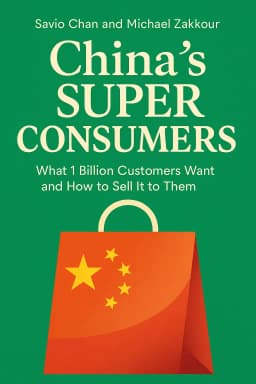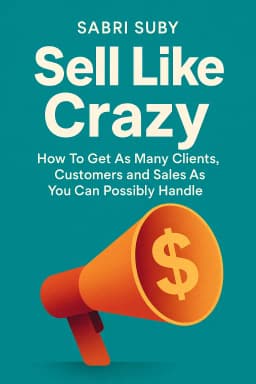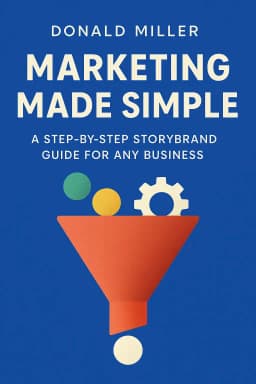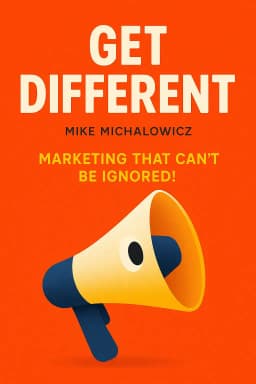
From Mao to Michael Kors
What 1 Billion Customers Want and How to Sell It to Them
Golden Hook & Introduction
SECTION
Olivia: Alright Jackson, quick guess. What’s bigger: America’s Black Friday and Cyber Monday online sales… combined? Jackson: Oh, that’s got to be the biggest shopping event in the world, right? The digital stampede for deals. There's no way anything tops that. Olivia: Not even close. A single day, on a single Chinese platform, more than doubles it. Jackson: That's not possible. Doubles it? You're talking about tens of billions of dollars. That's a rounding error in some countries' GDP. How? Olivia: That "how" is exactly what we're diving into today. It's the story of a new economic superpower, not of manufacturing, but of shopping. We're exploring the world of China's Super Consumers: What 1 Billion Customers Want and How to Sell It to Them by Savio Chan and Michael Zakkour. Jackson: China's Super Consumers. I like the sound of that. It’s got a comic book hero vibe. Olivia: It really does. And these authors, Chan and Zakkour, aren't just academics watching from afar. They're on-the-ground consultants, in the trenches helping companies navigate this. They wrote this book back in 2014, right at that pivotal moment when the world was waking up to the fact that China wasn't just the world's factory anymore. It was quickly becoming its shopping mall. Jackson: So they had a front-row seat to this massive shift. Olivia: A front-row seat, and maybe even a backstage pass. And to understand how an entire nation becomes a super consumer, you have to rewind the clock. The story of the Chinese consumer is a story of incredible historical whiplash.
The Historical Whiplash: From Mao to Michael Kors
SECTION
Jackson: Whiplash? That's a strong word. What do you mean by that? Olivia: I mean going from zero to a hundred in the span of a single generation. The book opens with this incredible snapshot of a woman named Yan Wu, a 28-year-old advertising executive in Shanghai. Jackson: Okay, I’m picturing her. Young professional in a global city. Olivia: Exactly. Her morning routine is a parade of global brands. She puts on her Michael Kors shoes, a Zara blouse, Levi's jeans. She carries a Tory Burch handbag, and inside is a Fendi wallet. She stops at Starbucks for a latte, paying with a 100 RMB note. She’s using eyeliner she bought at Sephora and taking GNC vitamins. Jackson: Right, sounds like a typical young professional in New York, London, or Tokyo. What’s the big deal? Olivia: The big deal is that her parents, just one generation before her, lived in a world where that entire paragraph would have been incomprehensible. Under Mao, consumerism was a dirty word. It was bourgeois. Choice was nonexistent. You got what the state provided, and you used ration coupons to get it. Jackson: Ration coupons. That’s a world away from a Fendi wallet. Olivia: It’s another planet. The book mentions that during that era, if a woman wanted a touch of color, a bit of blush, she might have to resort to rubbing sandpaper on her cheeks. Jackson: Hold on. Sandpaper? As in, the stuff you use on wood? Olivia: Yes. From sandpaper to a five-story Sephora flagship store in Shanghai in the span of about 30 years. That’s the whiplash. It’s one of the most dramatic and rapid societal transformations in human history. Jackson: That is genuinely mind-blowing. How does a society even process that kind of change? What flipped the switch? Olivia: The book points to Deng Xiaoping, who came to power after Mao. He famously declared, "To get rich is glorious." It was a complete 180-degree turn from communist ideology. It was permission. It was a green light for ambition, for enterprise, for wealth. Jackson: "To get rich is glorious." That's a heck of a slogan. It’s direct, I’ll give it that. Olivia: And it unleashed decades of pent-up desire. This is where the book introduces the "Chinese Dream." It's different from the American Dream of a house with a white picket fence. The authors tell this amazing story about one of them, Michael, having lunch with a university intern in Beijing back in 2003. He asks her what she hopes for after graduation. She gives him a one-word answer: "Freedom." Jackson: And freedom means democracy, free speech, all of that? Olivia: That’s what he thought. But he asked her to elaborate. And she said, "I want to be free to find a great job, a great career, to make a lot of money, and to spend it as I see fit." Jackson: Wow. So freedom, for her, was economic. It was consumer freedom. Olivia: Precisely. It was the freedom from scarcity. The freedom to participate in the world of brands and choices that her parents were denied. That single conversation, the book says, is what made the author realize his entire career would be about understanding this new consumer. This is the engine driving everything. It’s not just about economics; it’s about a deep, historical, psychological release.
Decoding the 'China Market': It's Not One Place, It's an Ecosystem
SECTION
Jackson: Okay, so a billion people suddenly have money, they have permission to get rich, and they have this pent-up desire to spend it. For a Western brand, that must sound like a gold rush. Just show up with your products and sell, right? Olivia: That is the classic foreigner's folly, and it's where so many incredibly smart companies crash and burn. The book is filled with these cautionary tales. The central message here is that there is no such thing as 'the China market.' It’s a collection of dozens of different markets, with different climates, dialects, histories, and tastes. Jackson: It’s more like treating Europe as a single country. A German shopper is not a Spanish shopper. Olivia: Exactly, but amplified. The book tells the fantastic story of the great pizza wars: Pizza Hut versus Domino's. Both are huge American brands. Both sell pizza. But their fates in China couldn't be more different. Jackson: I’m intrigued. How did the pizza wars play out? Olivia: Pizza Hut went in and did its homework. They realized that for many Chinese consumers, Western food wasn't just a quick meal; it was an event. It was a social experience. So they created these nice, sit-down restaurants. They became a place for a date, a family celebration. They localized their menu with things like Thousand Island dressing instead of tomato sauce, and toppings with local ingredients. They became a destination. Jackson: And Domino's? Olivia: Domino's tried to transplant its American model directly: 30-minute delivery. But that model is built for American suburbs, for families ordering a pizza on a Tuesday night. It didn't work in the dense, vertical cities of China. People didn't eat pizza that way. The delivery infrastructure was a nightmare. They failed to understand the cultural context of the meal. Today, Pizza Hut has thousands of restaurants in China. Domino's is a tiny, almost irrelevant player. Jackson: That’s a perfect example. Give me another one. A big one. Olivia: Whirlpool. The appliance giant. In the 90s, they saw the booming Chinese middle class and rushed in. They formed five joint ventures in less than a year, investing over a hundred million dollars. But they didn't do their due diligence. They didn't understand the consumer. Jackson: What did they miss? An appliance is an appliance, isn't it? Olivia: Not in China. They tried to sell large, American-style refrigerators to families living in small apartments. They offered washing machines without realizing that many Chinese consumers, especially in certain regions, preferred to wash clothes by hand or in smaller machines. They didn't realize that local brands like Haier were already making products perfectly tailored to Chinese homes and habits. Within a few years, Whirlpool had to pull out of most of its ventures, having lost a fortune. Jackson: They just went in blind. It’s amazing. Olivia: It's a classic case of what the book calls a lack of "cultural orientation." The authors say your China strategy has a shelf life of about six months. After that, it stinks. Jackson: Six months! That's insane. In the West, a five-year plan is standard. How can you even operate in an environment that changes that fast? Olivia: You have to be incredibly agile. You have to be listening constantly. And you have to understand the channels. For instance, a department store in China isn't like a Macy's or a Nordstrom. Chinese department stores are basically landlords. They rent out space to brands. The brand has to hire its own staff, manage its own inventory, and run its own little shop-within-a-shop. Jackson: So it's not about just selling a product to a retailer. It's about understanding the entire cultural and business operating system. And that system is incredibly complex and fast-moving. Olivia: And now, that operating system is going global. It's not just about selling to China anymore. It's about how China is changing us.
The New Globalization: How Chinese Super Consumers Are Shaping the World
SECTION
Jackson: What do you mean, 'changing us'? I get that it's a huge market, but how is it shaping things outside of China? Olivia: The book introduces this concept of the "China Global Demographic." These are the millions of Chinese super consumers who are traveling the world for business, for pleasure, for education. And they are spending. A lot. Jackson: The traveling shoppers. I've seen the tour buses in Paris and New York. Olivia: It's way beyond that now. The book tells this incredible story about Tourneau, the luxury watch retailer in New York City. For Chinese New Year, they threw a massive party at their flagship store in Manhattan. Jackson: Okay, a little event for tourists. Makes sense. Olivia: It was more than a little event. The CEO, an American, got up and addressed the crowd of 800 Chinese guests in Mandarin. They had traditional lion dancers performing right there in the store, with gongs and drums. They handed out red envelopes. They completely re-themed their iconic New York store to create an authentic Chinese holiday experience. Jackson: Wow. So a classic American luxury brand in the heart of Manhattan is fundamentally changing its operations for Chinese tourists. That’s a huge power shift. Olivia: It's Globalization 2.0. And the reason is simple math. The book points out that because of high import duties and consumption taxes in China, a luxury watch can cost 30-40% more in Shanghai than in New York. So, it makes economic sense to fly to another country, have a vacation, and buy your luxury goods there. Some reports say over 70% of all luxury purchases by Chinese consumers happen outside of mainland China. Jackson: So the real market for Chinese luxury spending isn't even in China. It's everywhere. Olivia: It's everywhere. And it's evolving. It's not just about buying a Gucci bag anymore. The book talks about the rise of experiential luxury. There's a story about a wealthy Chinese golf fanatic. His dream was to play at Pebble Beach with his favorite PGA golfer. Money alone couldn't buy that. It required connections, access. A company helped arrange it, and that experience was worth more to him than any physical product. Jackson: That makes sense. The ultimate status symbol isn't something you can buy off the shelf; it's an experience no one else can have. But what about the negative stereotypes? The book must touch on the 'rude tourist' phenomenon, right? It's a common headline. Olivia: It does, but it offers a much more insightful perspective. It frames it as a learning curve. For many, this is their first time traveling abroad. They are navigating new cultures, new norms. The authors argue that this presents a massive opportunity for brands, hotels, and even countries to act as educators and guides—to help these new global citizens navigate the world. It’s a chance to build deep, lasting relationships, not just make a quick sale. Jackson: That’s a much more empathetic and intelligent take. It’s not a problem, it’s an opportunity. Olivia: Exactly. It's about seeing the person, not just the wallet.
Synthesis & Takeaways
SECTION
Jackson: This has been a whirlwind tour. From sandpaper to Fendi, from Pizza Hut to Pebble Beach. If you had to boil it all down, what's the one big takeaway from China's Super Consumers? Olivia: I think it's that China's consumer revolution isn't just an economic story; it's a deeply human one, rooted in a century of history. You have to understand the "Century of Humiliation" from the Opium Wars, the extreme austerity and conformity under Mao, and then this explosive, almost violent release of pent-up desire for choice, for status, for a place in the world. Jackson: So the history is the software. Olivia: The history is the software. It's the cultural DNA. Understanding that history is the only way to understand why a young woman in Shanghai defines freedom as the ability to buy a latte at Starbucks, or why a businessman values a round of golf at Pebble Beach so highly. It's a reclamation of pride and place. And now, that collective desire, that engine, is so powerful it's reshaping global business. Jackson: And the companies that get it right are the ones that see that deeper story. Olivia: Absolutely. The book makes it clear: companies that see China as just another market on a spreadsheet will fail. They'll be the next Whirlpool or Domino's. The ones that see it as a civilization, with a unique history and a complex psychology, are the ones that will win. They're the ones who will build the next Pizza Hut or Lenovo. Jackson: That's a powerful way to put it. It makes you think about what products or brands you've seen that have tried—and maybe failed—to make that leap. We'd love to hear your examples. Find us on our socials and share your stories of cultural business wins or fails. Olivia: This is Aibrary, signing off.









